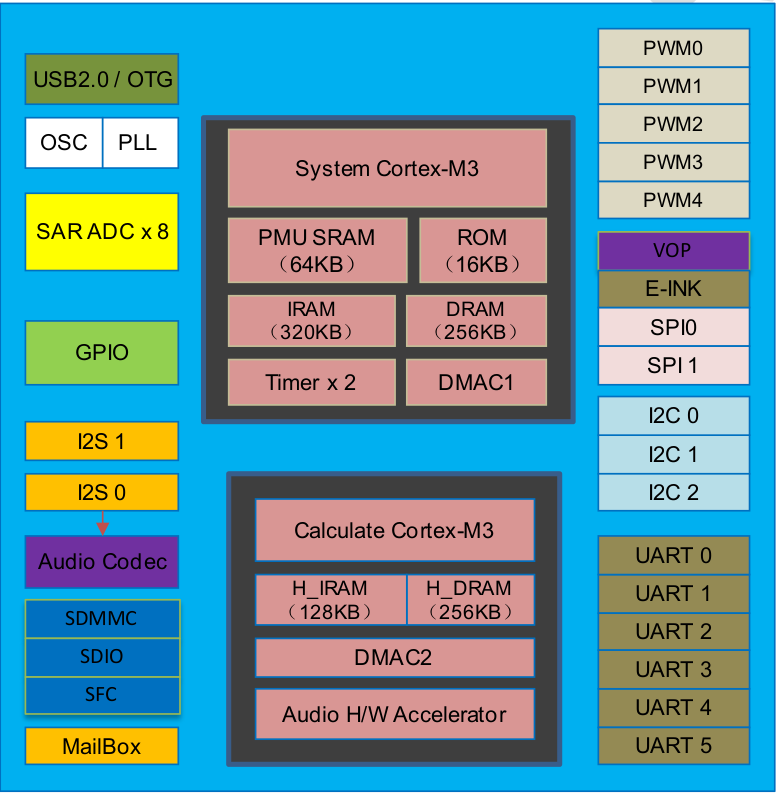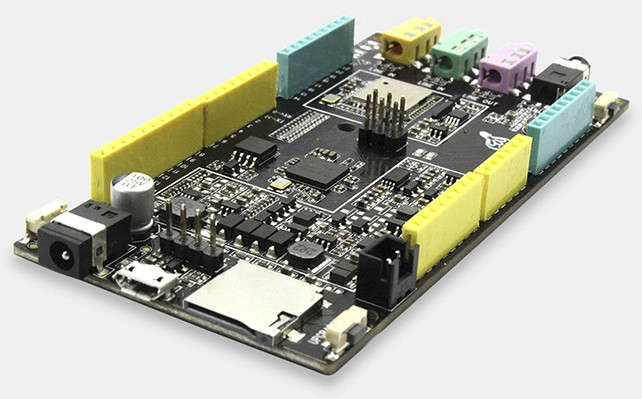Rockchip RKNanoD dual core Cortex M3 micro-controller was introduced last year for IoT and audio applications, and the Firefly team, known for their FirePrime or Firefly-RK3288 development boards, has designed an Arduino compatible board based on the MCU with lots of audio ports, Arduino headers, and WiFi connectivity.
- MCU – Rockchip RKnanoD dual core ARM Cortex M3 MCU @ up to 250 MHz (system core) / 500 MHz (calculate core) with respectively 640 KB and 384 KB RAM
- Storage – 4 or 8MB SPI flash + micro SD slot
- Audio
- 24-bit/192 KHz audio codec (built in MCU) with HW accelerator for APE, FLAC, OGG, and MP3 audio decoding
- 1x 3.5mm analog audio jack
- 2x 3.5mm LINE In jacks
- 1x On-board microphone
- DLNA wireless audio support
- Connectivity – 802.11 b/g/n WiFi via Ampak AP6181 module
- Expansion
- Arduino header with I2C, SPI, ADC, GPIO, PWM, UART
- LCD interface (Intel 8080 mode) up to 400×400 resolution
- Debugging – Serial console
- Misc – HYM8563 RTC chip, 2x user LEDs, 1x power LED, buttons (reset, power and upgrade)
- Power Supply – 5 to 12V via 5.5/2.1mm DC jack ; 5V via micro USB port
- Dimensions – 108.8 x 53.4 mm
- Weight – 37 grams
The board can be programmed with either the Arduino IDE, or FireBlocks, a fork of Scratch visual programming utility.

The board can be used for robotics thanks to its many I/Os, IoT with WiFi connectivity, or for audio applications with the on-chip audio codec and various audio connectors. Some documentation is already available on the Wiki, and a few potential applications are shown in the promo video below.
The project will be launched in Kickstarter next week (June 27), and the draft page currently shows the board can be had for as low as $15 with an 8GB micro SD card with an “Hello World” pledge, but the normal KS price will be $25, and some rewards with various quantities up to 100 boards are also listed. Delivery is scheduled for September 2016. Since the page is still in draft mode, it’s not possible to check shipping fees for now.

Jean-Luc started CNX Software in 2010 as a part-time endeavor, before quitting his job as a software engineering manager, and starting to write daily news, and reviews full time later in 2011.
Support CNX Software! Donate via cryptocurrencies, become a Patron on Patreon, or purchase goods on Amazon or Aliexpress





